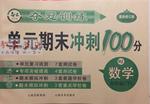
Today some people get ______ because they eat too much fat and sugar and don’t take enough ______.
A. fatter and fatter; exercise
B. fatter and fatter; exercises
C. thinner and thinner; exercise
D. thinner and thinner; exercises
 夺冠训练单元期末冲刺100分系列答案
夺冠训练单元期末冲刺100分系列答案 新思维小冠军100分作业本系列答案
新思维小冠军100分作业本系列答案 名师指导一卷通系列答案
名师指导一卷通系列答案科目:高中英语 来源:2004年高考北京四中全真模拟试卷 英语 题型:050
阅读理解
阅读下列短文,从每题所给的A、B、C、D四个选项中,选出最佳选项,并在正确选项上画勾。
How can we get rid of garbage? Do we have enough energy sources to meet our future energy needs?
These are two important questions that many people are asking today. Some people think that men might be able to solve both problems at the same time. They suggest using garbage as an energy source.
For a long time people buried garbage or dumped it on empty land. Now, empty land is scarce. But more and more garbage is produced each year. But garbage can be a good fuel to use. The things in garbage do not look like coal, petroleum, or natural gas; but they are chemically similar to these fossil fuels. As we use up our fossil![]() fuel supplies, we might be able to use garbage as an energy source.
fuel supplies, we might be able to use garbage as an energy source.
Burning garbage is not a new idea. Some cities in Europe and the United States have been burning garbage for years. The heat that is produced by burning garbage is used to boil water. The steam that is produced is used to make electricity or to heat nearby buildings. In Paris, France, some power plants burn almost 2 million metric tons of the city's garbage each year. The amount of energy produced is about the same as would be produced by burning almost a half million barrels of oil!
But there are problems in using garbage as a fuel. Garbage that burns easily, such as food scrapes and paper, must be separated from metals, glass, and other materials that do not burn easily. This separation process is normally costly. Another problem is that burning garbage can pollute the air.
Our fossil fuel supplies are limited. Burning garbage might be one kind of energy source that we can use to help meet our energy needs. This method could also reduce the amount of garbage piling up on the earth.
1.What two problems can be solved by burning garbage?
[ ]
A.The shortage of energy; air pollution.
B.The shortage of energy; the shortage of empty land for holding garbage.
C.Air pollution; the shortage of empty land for holding garbage.
D.Air pollution; the shortage of fossil fuel.
2.Which of the following is NOT a result of burning garbage?
[ ]
A.The heat produced is used to boil water.
B.The steam produced is used to make electricity.
C.The garbage burned is turned into fossil fuels.
D.The steam produced is used to heat buildings.
3.According to the passage, which of the following four groups of garbage is ready for burning?
[ ]
A.Food scraps and metals
B.Paper and glass.
C.Metals and glass.
D.Food scraps and paper.
查看答案和解析>>
科目:高中英语 来源:2012-2013学年江苏省徐州市第五中学高一上学期期中考试英语试卷(带解析) 题型:阅读理解
“If you want to see a thing well, reach out and touch it!” That may seem a strange thing to say. But touching things can help you to see them better. Your eyes can tell you that a glass ball is round. But by holding it in your hands, you can feel how smooth and cool the ball is. You can feel how heavy the glass is. When you feel all these about the ball, you really see it. With your skin, you can feel better. For example, your fingers can tell the difference between two coins in your pocket. You can feel a little drop of water on the back of your hand, too.
All children soon learn what “Don’t touch!” means. They hear it often. Yet most of us keep on touching things as we grow up. In shops, we touch things as we might buy: food, clothes. To see something well, we have to touch it.
There are ways of learning to see well by feeling. One way is to close your eyes and try to feel everything that is touching your skin. Feel the shoes on your feet, the clothes on your body, the air on your skin. At first, it is not easy to feel these things. You are too used to them!
Most museums are just for looking. But today some museums have some things to touch. There you can feel everything on show. If we want to see better, reach out and touch. Then you will really see.
【小题1】By touching things,________.
| A.you will have a strange feeling |
| B.you will learn how to reach out your hand |
| C.you can tell the difference of the things |
| D.you can tell what colors they are |
| A.try them on first | B.keep their right hands on them |
| C.ask about them | D.feel and touch them |
| A.the things are used by people, too | B.people feel the things too often |
| C.people know how to use the things | D.the things are hard to feel |
| A.Touching by Feeling | B.To See or to Feel? |
| C.To See Better---Feel | D.Ways of Feeling |
查看答案和解析>>
科目:高中英语 来源:2013年全国普通高等学校招生统一考试英语(江苏卷带解析) 题型:阅读理解
We’ve considered several ways of paying to cut in line: hiring line standers, buying tickets from scalpers (票贩子), or purchasing line-cutting privileges directly from, say, an airline or an amusement park. Each of these deals replaces the morals of the queue (waiting your turn) with the morals of the market (paying a price for faster service).
Markets and queues—paying and waiting—are two different ways of allocating things, and each is appropriate to different activities. The morals of the queue, “First come, first served, have an egalitarian (平等主义的) appeal. They tell us to ignore privilege, power, and deep pockets.
The principle seems right on playgrounds and at bus stops. But the morals of the queue do not govern all occasions. If I put my house up for sale, I have no duty to accept the first offer that comes along, simply because it’s the first. Selling my house and waiting for a bus are different activities, properly governed by different standards.
Sometimes standards change, and it is unclear which principle should apply. Think of the recorded message you hear, played over and over, as you wait on hold when calling your bank: “Your call will be answered in the order in which it was received.” This is essential for the morals of the queue. It’s as if the company is trying to ease our impatience with fairness.
But don’t take the recorded message too seriously. Today, some people’s calls are answered faster than others. Call center technology enables companies to “score” incoming calls and to give faster service to those that come from rich places. You might call this telephonic queue jumping.
Of course, markets and queues are not the only ways of allocating things. Some goods we distribute by merit, others by need, still others by chance. However, the tendency of markets to replace queues, and other non-market ways of allocating goods is so common in modern life that we scarcely notice it anymore. It is striking that most of the paid queue-jumping schemes we’ve considered—at airports and amusement parks, in call centers, doctors’ offices, and national parks—are recent developments, scarcely imaginable three decades ago. The disappearance of the queues in these places may seem an unusual concern, but these are not the only places that markets have entered.
【小题1】According to the author, which of the following seems governed by the principle “First come, first served”?
| A.Taking buses. | B.Buying houses. |
| C.Flying with an airline. | D.Visiting amusement parks. |
| A.the necessity of patience in queuing |
| B.the advantage of modern technology |
| C.the uncertainty of allocation principle |
| D.the fairness of telephonic services |
| A.justify paying for faster services |
| B.discuss the morals of allocating things |
| C.analyze the reason for standing in line |
| D.criticize the behavior of queue jumping |
查看答案和解析>>
科目:高中英语 来源:2014届福建省高一下学期第二阶段考试英语试卷(解析版) 题型:阅读理解
“If you want to see a thing well, reach out and touch it!”
That may seem a strange thing to say. But touching things can help you to see them better.
Your eyes can tell you that glass ball is round. But by holding it in your hands, you can feel how smooth and cool the ball is. You can feel how heavy the glass is.
When you feel all these about the ball, you really see it.
With your skin, you can feel better. For example, your fingers can tell the difference between two coins in your pocket. You can feel a little drop of water on the back of your hand, too.
You can even feel sounds against your skin. Have you ever wanted to know why some people like very loud music? They must like to feel the sounds of music.
All children soon learn what “Don’t touch!” means. They hear it often. Yet most of us keep on touching things as we grow up. In shops, we touch things we might buy, such as food, clothes and so on. To see something well, we have to touch it.
The bottoms of our feet can feel things, too. You know this when you walk on warm sand, cool grass or a bad floor. All feel different under your feet.
There are ways of learning to see well by feeling. One way is to close your eyes and try to feel everything that is touching your skin. Feel the shoes on your feet, the clothes on your body, the air on your skin. At first, it is not easy to feel these things. You are too used to them!
Most museums are just for looking. But today some museums have some things to touch. Their signs say, “Do touch! There you can feel every thing on show. If you want to see better, reach out and touch. Then you’ll really see!”
1.By touching things _______.
A.you will have a strange feeling
B.you will learn how to reach out
C.you can tell the difference between them
D.you can tell what colors they are
2.Which of the following can be the best title of the story?
A.Touching by Feeling B.To See or to Feel
C.To See Better — Feel D.Ways of Feeling
3.When people buy things in shops, they often _______.
A.try them on first
B.put their right hand on them
C.just has a look
D.feel and touch them
4.Why does it say, “At first, it is not easy to feel these things?”
A.The things are used by people, too.
B.People are used to the things.
C.People know how to use the things.
D.The things are easy to feel.
5.Which of the following is true?
A.Touching can help people learn things better.
B.Our feet, fingers, hands and skin can help us enjoy music.
C.People have to learn to see by feeling as they grow up.
D.Visitors cannot feel the things on show in some museums.
查看答案和解析>>
科目:高中英语 来源:广东省山一2010届高三第八次模拟考试试题(英语) 题型:阅读理解
III. 阅读理解(共两节,满分40分)
第一节 阅读理解(共15小题;每小题2分,满分30分)
阅读下列短文,从每题所给的A、B、C和D项中,选出最佳选项,并在答题卡上将该项涂黑。
It’s hard to believe that before 1985, people in Britain didn’t use mobile phones. That was the year when the first mobile phone company began operation in the UK, although in other parts of Europe mobiles had been used for several years.
Early mobiles were much larger than they are today. Some of them weighed about 5 kg and the owners had to pay several thousand pounds for them. By the beginning of the 1990s, companies in the UK had updated their mobile phones so they were more like the mobiles used all over Europe. Those phones weighed about 500g, and the batteries lasted longer,whereas before they had lasted for only one hour’s talk-time.
Nowadays, some of our mobiles weigh as little as 50g and have a talk-time of up to five hours and a battery life of up to 10 days. About 80% of UK adults now own a mobile phone, and there are now almost 50 million mobile phone users in the UK.
Nobody had ever expected mobile phones to become so popular. One huge surprise was the increase in the use of text messages. Twenty years ago, people didn’t hear of “texting”. Now, over one billion text messages are sent every month in the UK. People are also using their mobile phones as music centers, as personal organizers and to surf the Internet.
Mobile phones are developing all the time and people are predicting that soon nobody will want to leave his house without one in his pocket. Mobile phones will no longer be just useful, but necessary for people in the UK.
41. What is the main idea of the passage?
A. Mobile phones in the UK are getting smaller and lighter.
B. Mobile phones in the UK have more functions now.
C. Mobile phones in the UK are developing very slowly.
D. The history development of mobile phones in the UK.
42. Which of the following is NOT true according to the passage?
A. Mobile phones in the UK appeared earlier than in other parts of Europe.
B. In the UK some early mobile phones were about 100 times as heavy as those today.
C. In the UK more than twelve billion text messages are sent every year.
D. The British use mobiles to enjoy music, organize personal lives and surf the Internet.
43. When was the first mobile phone company started in the UK?
A. In 1985. B. Before 1985. C. In 1990. D. In 1970.
44. Which word can replace the underlined “whereas” in the second paragraph?
A. when B. while C. just D. till
45. What does the last paragraph mainly tell us?
A. Mobile phones will be predicting daily life in the UK.
B. Mobile phones will be more popular in the UK.
C. Mobile phones will be necessary for people in the UK.
D. Mobile phones will develop quickly.
查看答案和解析>>
湖北省互联网违法和不良信息举报平台 | 网上有害信息举报专区 | 电信诈骗举报专区 | 涉历史虚无主义有害信息举报专区 | 涉企侵权举报专区
违法和不良信息举报电话:027-86699610 举报邮箱:58377363@163.com